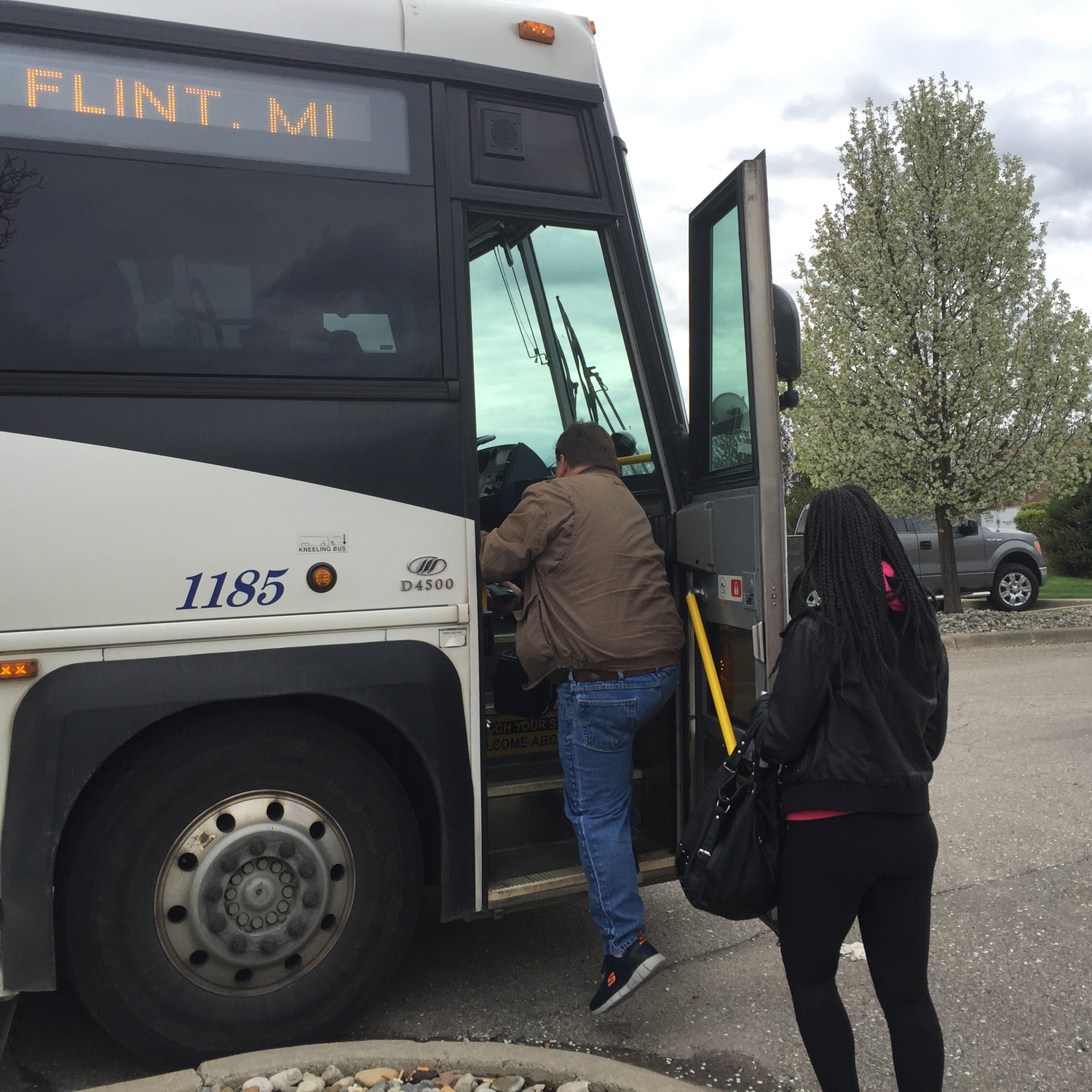People need jobs. Factories need workers. Busing, a love story.
Last year, Lamont Allen was one of the 10,000 people in the Flint area without a job. Worse, he had low job skills, a prison record and no car.
Forty miles south, at least 800 manufacturing jobs were waiting, unfilled in Livingston County.
Then, in December, business, nonprofit and transportation officials came up with a partnership that connected jobs in Livingston County to Flint residents who were eager for work but lacked a vehicle to get there.
“If you would’ve told me that there were so many people interested in helping people in Flint with a background like mine, I wouldn’t have believed you,” Allen said. “I didn’t believe what was on my resume would get me a job – that’s not being negative. It’s just that it’s very difficult.”
As a result of this program, Allen, 57, gets on a public bus just before 4 p.m. in Flint three to four days a week and takes a 45-minute ride to Howell to work at Tribar Manufacturing, which makes products for the automotive industry.
Within four months, this new job, with its 12-hour shifts and $11 per-hour income, has led to Allen getting a driver’s license for the first time since the 1980s. And a car.
“Flint is really highlighted as one of the worst places to live in because it’s poverty-stricken, high crime and the water” crisis, Allen said. “I usually don’t get opportunities like this. I’m blessed.”
This public-private partnership is not the first time the Mass Transit Authority in Flint has transported workers between the city and Livingston County. But the success of the effort has drawn interest from other companies and reignited a conversation in Livingston and across Michigan about how innovative transportation projects can help businesses trying to fill jobs along with lower-income workers who don’t otherwise have access to consistent transportation.
The state’s economic recovery is threatened by “a lack of adequate financial resources to address the state’s transportation challenges,” according to a 2015 study by TRIP, a nonprofit in Washington DC.
In focusing on the state’s poor roadways and bridges, the study found that Michigan needs more public transit from rapid bus to railways, including arteries to connect transit facilities in densely populated areas such as Troy/Birmingham, Grand Rapids, Dearborn, East Lansing, Ann Arbor and Detroit.
Some regions are already making efforts.
In the Upper Peninsula, the website Get Around the Western U.P. was created following a 2011 study of transit needs in Copper Country (Baraga, Houghton and Keweenaw counties). The website helps the area’s nearly 50,000 residents scattered across 2,455 square miles find private and public bus service, carpools and bicycling options.
In 2012, a transportation partnership led to a regional bus route that connects Benzie County and Traverse City.
Michael Frezell, spokesman for the Michigan Department of Transportation, said there are efforts statewide to examine the feasibility and need for regional transit. Among them, the biggest is the Regional Transit Authority of Southeast Michigan’s plan for rapid bus transit across metro Detroit, which will require a millage that will go before voters this fall.
Regional transit is "something everybody sees the need for, but getting it off the ground with funding is a different story," Frezell said.
Economic development or tax hit?
Those involved in the Livingston program say they would like to see it expanded. But any service that requires more taxes typically faces steep resistance in the region. The county has no regular public bus service (only a door-to-door bus service) and prides itself on low taxes.
“Companies want to grow and people want to work,” said Paul Krutko, president and CEO of Ann Arbor SPARK, a nonprofit that works on economic development and has expanded its focus to Livingston County. “That’s a positive. How do you take advantage of that? If the companies can’t fill those jobs as any company does today, they will look at other places where they can locate which may be no longer in Livingston County.”
Krutko said finding ways to fill in those transportation gaps is not about charity; rather, it’s “an economic development issue. There are employers who are looking for the Livingston County community to come together around some sort of solution.”
The busing plan that connects Tribar Manufacturing to Flint workers could be the beginning of something bigger. It began with an informal meeting among business officials who get together periodically to discuss industry challenges.
Last fall, someone mentioned that dozens of Flint residents carpooled to jobs in the Howell area. One car problem or sick driver could keep four people out of work for a day. That was a problem not only for workers, but for their employers, which faced increased absenteeism and turnover.
A survey of Livingston County employers found more than 800 unfilled jobs, 59 percent of which pay $10 to $13 per hour. Of that, 57 companies said they would coordinate work shifts if a transportation service could be organized to shuttle employees to job sites; 21 of those companies said they are willing to pay for the transportation.
“The big story is, we have an employee shortage,” said Pat Convery, president of the Howell Area Chamber of Commerce. “We’ve been continually looking for options because the jobs are here.”
Tribar Manufacturing and MTA coordinated worker transportation between the two cities with the help of a nonprofit, Community Ventures of Michigan, which helps ex-offenders, disabled workers and those on social welfare find and keep full-time jobs. The group also provides up to two years of life coaching, mentoring and financial help with daycare and transportation.
Of the 120 people taking an MTA bus to Tribar, about 60 were hired since January through Community Ventures, said Jon Walter, chief operating officer for the company. Community Ventures, started in 2013, works in Flint, Saginaw, Pontiac and Detroit and has helped more than 4,000 people find work, said Michael Finney, president and CEO of the nonprofit and former CEO for the Michigan Economic Development Corporation.
Community Ventures pays the bus passes of workers it places with Tribar. Tribar pays for the bus passes - $80 for a month, or $3 each way - for workers not involved with the Community Ventures program, leaving those workers to pay $10 per paycheck toward the bus passes.
Flint residents have long dealt with transportation hurdles, a problem that has only gotten worse in the decades since automobile factories began to close. The unemployment rate for the Flint area is officially about 5 percent, but the poverty rate is about 40 percent. In Flint, 19.7 percent of households did not have a vehicle, compared with the state average of 7.9 percent, according to the 2010-14 U.S. Census American Community Survey data. The per capita income is $15,254 in Flint compared with $27,140 for the state.
Community Ventures said it has identified 20,000 people in Flint who are unemployed, underemployed or in poverty and could benefit from the group’s services.
“We’re finding employers are in fact willing to take a chance on people they would not otherwise hire. That is dependent on us supporting them,” Finney, the Community Ventures CEO, said. “Transportation is the biggest issue for people from Flint.”
Busing Flint workers to other counties is not new. MTA has transported workers to other parts of the region since 1997, with 21 routes seven days a week to hubs in places like Troy and Saginaw and to jobs in Lapeer and Eaton County daily, said Edgar Benning, CEO of MTA.
“Our business is all about providing great transportation so people can live their lives, earn income and bring it back and continue to live in our county,” Benning said.
MTA is looking to establish a temporary hub in Livingston. Ideally, Benning said, MTA could transport workers to a hub such as a plant or shopping center parking lot and then the Livingston Essential Transportation Service (LETS), the local dial-a-ride public bus service, would run shuttles to specific worksites. That’s in talks now.
More long-range buses would be needed to expand service from Flint to Livingston County, at a cost of $700,000 each, Benning said. MTA is funded by local and federal funds, but is looking to expand without asking taxpayers for more money, Benning said. “We think is our future is in public-private partnerships.”
Bumps in the road
March Coatings, a painting company in Brighton, has benefited for years from an MTA bus route that runs from Flint, bringing workers to its two plants in Livingston County. But the company said it would gain even more from expanded service.
“So far, MTA fills 65 percent of our needs,” Jill Warner, the company’s vice president of finance, said. The problem is, bus service from Flint is available only a couple times a day during the week, and not during times some workers need it. “We run into trouble with two odd (schedule) shifts and on weekends,” Warner said.
The Howell city council last month approved a resolution to expand the Livingston Essential Transportation Service to a millage-funded transportation authority. The move would allow the dial-a-ride bus service to capture more state and federal funding. Expansion could mean more trips to businesses in Livingston, such as March Coatings.
But the idea is not exactly cruising ahead. No budget has been proposed. No timeline, either.
Doug Britz, transportation director for Livingston County, said expanding public transportation in and to Livingston is “without a doubt” an economic development issue. But he expects that means the discussion will hit some bumps in the road because it would raise taxes. The idea would require more funding from a county where residents do not typically approve tax hikes.
The discussion within the county is “very much in its infancy,” Britz said. “It’s not moving very quickly.”
Business Watch
Covering the intersection of business and policy, and informing Michigan employers and workers on the long road back from coronavirus.
- About Business Watch
- Subscribe
- Share tips and questions with Bridge Business Editor Paula Gardner
Thanks to our Business Watch sponsors.
Support Bridge's nonprofit civic journalism. Donate today.
See what new members are saying about why they donated to Bridge Michigan:
- “In order for this information to be accurate and unbiased it must be underwritten by its readers, not by special interests.” - Larry S.
- “Not many other media sources report on the topics Bridge does.” - Susan B.
- “Your journalism is outstanding and rare these days.” - Mark S.
If you want to ensure the future of nonpartisan, nonprofit Michigan journalism, please become a member today. You, too, will be asked why you donated and maybe we'll feature your quote next time!


 MTA Flint sends buses twice a day to Tribar Manufacturing in Howell. The bus ride is available for anyone, but typically transports employees from the Flint bus station to work at the automotive parts plant. (Bridge photo by Chastity Pratt Dawsey)
MTA Flint sends buses twice a day to Tribar Manufacturing in Howell. The bus ride is available for anyone, but typically transports employees from the Flint bus station to work at the automotive parts plant. (Bridge photo by Chastity Pratt Dawsey) >
>